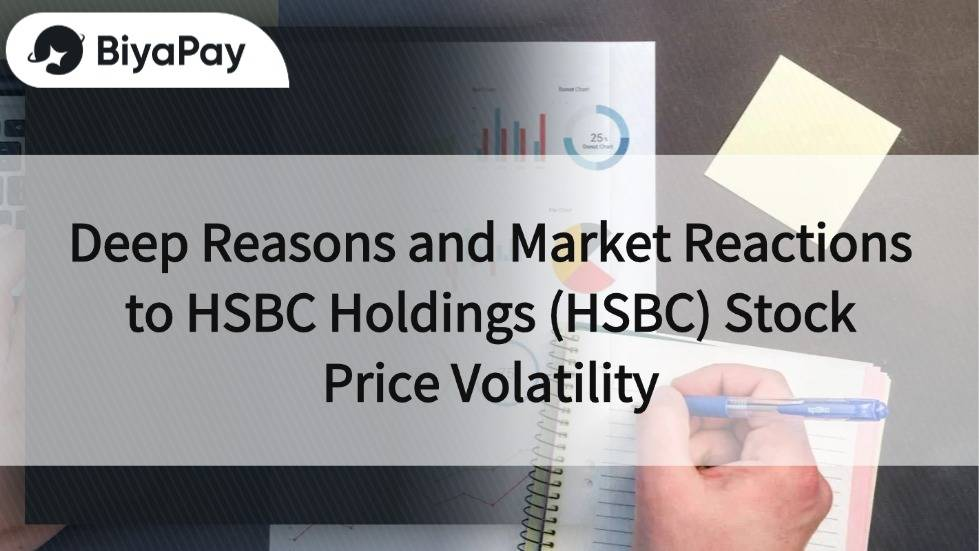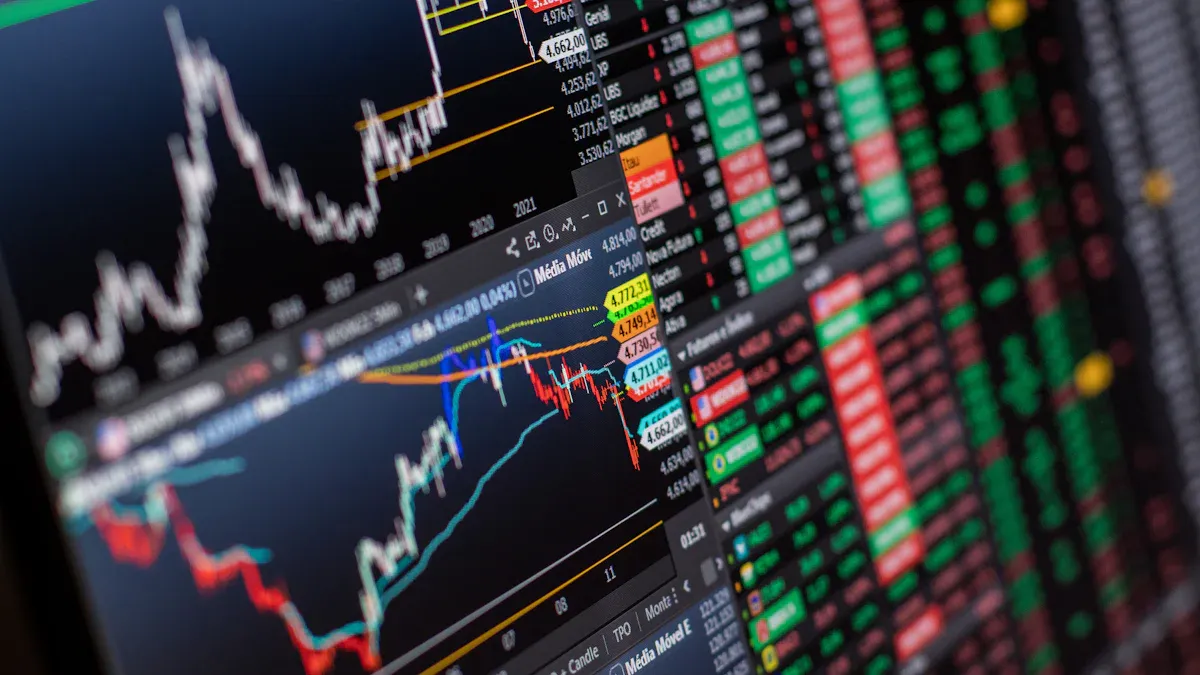- EasyCard
- Trade
- Help
- Announcement
- Academy
- SWIFT Code
- Iban Number
- Referral
- Customer Service
- Blog
- Creator
Deep Reasons and Market Reactions to HSBC Holdings (HSBC) Stock Price Volatility

Image Source: pexels
Recently, HSBC’s stock price has experienced significant volatility. The market is closely monitoring its first-quarter performance, with pre-tax profits exceeding expectations but showing a decline. The company announced a $3 billion share buyback program, which has also sparked investor discussions. Bank of Communications’ capital increase led to a reduction in HSBC’s shareholding ratio, while geopolitical tensions and global macroeconomic changes simultaneously affect market sentiment. Investors reacted promptly, with shifts in capital flows.
Key Points
- HSBC’s stock price is influenced by multiple factors, including macroeconomic conditions, regulatory policies, company performance, and geopolitical risks, requiring investors to fully understand these drivers.
- The company actively repurchases shares and promotes business restructuring to enhance profitability and shareholder returns, providing stable support for the stock price.
- Global economic uncertainty and geopolitical risks exacerbate market volatility, and investors should closely monitor relevant policies and market dynamics.
- Investors should regularly review HSBC’s financial reports and management strategies, while adopting risk management measures such as diversified investments and setting stop-loss points.
- Combining technical analysis with fundamentals and market sentiment helps determine optimal buying and selling opportunities, improving the accuracy of investment decisions.
Macroeconomic Factors

Image Source: pexels
Interest Rates and Inflation
Interest rates and inflation directly impact the banking industry. When the U.S. Federal Reserve adjusts interest rates, Hong Kong banks like HSBC Holdings are affected. When interest rates rise, banks’ net interest margins typically increase, but funding costs also rise. This leads to changes in banks’ profitability. In recent years, global inflationary pressures have persisted, with significant fluctuations in energy prices. High inflation reduces consumers’ and businesses’ willingness to borrow, decreasing loan demand for banks. These factors affect HSBC’s stock price performance.
Global Economic Uncertainty
Global economic uncertainty has increased, and investors are concerned about future market trends. The ongoing U.S.-China trade war has complicated the international trade environment. Geopolitical risks, such as escalating tensions between Israel and Iran, also affect market sentiment. Concerns about a U.S. economic recession have intensified, leading investors to favor safe-haven assets.
Economic policy uncertainty in major economies (e.g., the UK) has increased, impacting profit expectations and stock market valuations. The MSCI All Country World Index’s price-to-earnings ratio has reached a 10-year high, reflecting high valuations. The Chicago Board Options Exchange (CBOE) Volatility Index (VIX) and HSBC’s proprietary investor sentiment index indicate global stock market volatility. While investor sentiment has improved, it may not sustainably support stock market gains, suggesting a correlation between economic uncertainty and stock price volatility. High market valuations, weak profit revisions, and low leading economic indicators reflect the potential impact of economic uncertainty on stock prices.
These macroeconomic factors collectively contribute to HSBC’s stock price volatility in the short term. Investors need to closely monitor global economic trends to better understand market changes.
Industry and Regulation
Regulatory Policies
Banking industry regulatory policies frequently affect HSBC Holdings’ stock price. Regulatory authorities sometimes release new measures late at night, making market reactions difficult to predict. For example:
- In 2007, the Ministry of Finance suddenly raised stamp duty, causing significant short-term stock market volatility.
- In 2008, the Securities and Futures Commission regulated bulk share transfers, affecting stock liquidity.
- In 2013, the Securities and Futures Commission relaxed RQFII investment restrictions, promoting cross-border capital flows, impacting HSBC as a constituent stock of the Shanghai-Hong Kong Stock Connect.
- The China Banking Regulatory Commission and the central bank jointly issued guidelines on preferred share issuance for banks, optimizing bank capital structures and boosting bank stock valuations.
- The Shanghai-Hong Kong Stock Connect quota management policy regulates capital flows, directly affecting HSBC Holdings’ market performance.
These policies are often announced late at night, triggering strong market reactions. As a leading bank in Hong Kong, HSBC Holdings is frequently a direct beneficiary or victim of regulatory policy changes. Past compliance risks, such as money laundering scandals, have also caused significant fluctuations in HSBC’s stock price. Investors need to closely monitor regulatory developments to better assess risks.
Industry Competition
HSBC Holdings faces intense competition in the Hong Kong banking industry. In recent years, HSBC has actively promoted its wealth management business, achieving double-digit growth for five consecutive quarters, attracting $22 billion (USD) in new investment assets. The Hong Kong market added 300,000 new customers, demonstrating its market appeal. The transaction banking business performed strongly, with forex, equity, and debt trading benefiting from market volatility.
HSBC strictly implements cost management, promotes strategic cost allocation, and maintains a robust balance sheet. Despite unfavorable macroeconomic factors, HSBC sustains diverse and high-quality revenue sources. These performances enable HSBC to maintain a leading position in industry competition, supporting its stock price. Investors can compare performance data from different banks to gain a more comprehensive understanding of HSBC’s market advantages and risks.
Company Factors
Performance and Buybacks
HSBC Holdings’ third-quarter 2024 financial report shows net profit growth of 10%, reaching $8.5 billion (USD), exceeding market expectations. Revenue grew 5% year-on-year to $17 billion (USD), primarily driven by growth in wealth management and wholesale banking businesses. The company announced a stock buyback program of up to $3 billion (USD) and had already completed a $6 billion (USD) buyback program earlier in the year. These actions reflect management’s confidence in future cash flows and commitment to shareholder returns. A stable dividend policy (10 cents per share interim dividend) provides steady income for investors. Driven by the financial report and buyback news, HSBC’s stock price in Hong Kong rose 3.7% at one point, reaching a six-year high.
Investors should note that HSBC is promoting business restructuring, focusing on cost control and operational efficiency improvements, which are expected to further optimize resource allocation and enhance future profitability.
Bank of Communications Incident
Recently, Bank of Communications’ capital increase led to a reduction in HSBC Holdings’ shareholding ratio and recorded a pre-tax loss. This development has drawn market attention to HSBC’s long-term strategy in the Chinese market. Although the shareholding ratio decreased, HSBC continues to monitor risks in the Chinese real estate market and actively adjusts its credit policies to reduce the impact of credit losses on profitability. These measures help maintain the group’s overall financial stability, mitigating external risks’ pressure on HSBC’s stock price.
Management and Strategy
The management team is actively promoting business restructuring, targeting an average return on tangible equity of approximately 15% annually from 2025 to 2027. The company expects to reduce costs by approximately $300 million (USD) in 2025 and achieve a $1.5 billion (USD) annualized cost base reduction by the end of 2026. These measures help improve operational efficiency and optimize resource allocation. HSBC Hong Kong’s pre-tax profit in 2024 grew 9.5% year-on-year to $11.69 billion (USD), accounting for 36% of the group’s pre-tax profit in the same period.
Management emphasizes that it will continue to simplify the group’s structure, focus on core businesses, and closely monitor risks in the Chinese market to ensure the group’s long-term development.
Ge Political and Regional Risks
UK-China Relations
Changes in UK-China relations indirectly affect HSBC Holdings. In recent years, the UK government has strengthened scrutiny of policies toward China, posing challenges to HSBC’s business development in both regions. As a UK-registered bank with a primary focus on Hong Kong operations, HSBC often needs to balance policies between the two regions. When UK-China relations are tense, the market becomes cautious about HSBC’s prospects. Investors will pay attention to the UK government’s regulatory measures on Chinese companies, which may affect HSBC’s business expansion in China. When geopolitical risks rise, capital flows toward safe-haven assets, making HSBC’s stock price prone to volatility.
Hong Kong and Asian Markets
The situation in Hong Kong and Asian markets significantly affects HSBC Holdings’ stock price. The Asian region has substantial economic growth potential but also faces trade disputes and geopolitical risks. According to Morningstar reports, the following factors affect HSBC Holdings’ market performance:
- Ongoing U.S.-China trade tensions cause Asian stock markets to trade below fair value in the short term, with the financial services sector (including HSBC Holdings) being the most affected.
- Hong Kong social events have triggered pessimistic market sentiment, impacting financial industry valuations.
- Resolving U.S.-China trade disputes could boost market confidence, but it will take time to reflect in stock prices.
- Morningstar analysts believe the financial industry has long-term investment potential, with HSBC Holdings remaining one of the top picks in the sector.
- Political and economic situations, policy changes, and geopolitical risks are key factors influencing HSBC’s stock price volatility.
Policy stimuli and technological breakthroughs in Asian markets also boost market confidence. The Chinese stock market has become a focal point for emerging market investments, and as a leading bank in the region, HSBC Holdings’ stock price is closely tied to Asian market conditions. Escalating regional tensions (e.g., Israel-Iran conflicts) drive capital toward safe-haven assets, further exacerbating stock price volatility. Investors need to closely monitor regional policies and market dynamics to better assess risks.
HSBC Stock Price Market Reaction

Image Source: pexels
Investor Sentiment
Investor sentiment directly affects HSBC’s stock price short-term volatility. Recently, the market has been sensitive to Chinese economic data and corporate profit warnings. China’s April manufacturing PMI initial reading was 49.1, up from March but still below 50, indicating continued manufacturing contraction. This data has led investors to remain cautious about economic prospects. When companies issue profit warnings, HSBC Holdings and other heavyweight stocks experience significant declines, dragging down Hong Kong and Chinese stock markets, ending a three-week upward trend.
Overall market sentiment remains cautiously optimistic. A low-interest-rate environment and monetary supply expansion in major industrial countries provide support for short-term stock price rebounds. Investor sentiment survey data shows that the market’s immediate reactions to economic data and corporate profit conditions are key to interpreting HSBC’s stock price short-term volatility.
Analyst Forecasts
Analyst forecasts for HSBC’s stock price reflect the market’s view of the company’s prospects. Over the past year, analysts have repeatedly adjusted profit forecasts. When the company’s performance exceeds expectations, analysts raise target prices, driving short-term stock price rebounds. Conversely, if macroeconomic data is weak or the company faces regulatory risks, analysts lower profit forecasts, putting pressure on the stock price.
- In the second half of 2023, some international investment banks lowered HSBC Holdings’ profit forecasts due to China’s weaker-than-expected economic recovery.
- In the first quarter of 2024, HSBC Holdings’ performance exceeded expectations, and analysts generally maintained “hold” or “buy” ratings.
- Analyst reports indicate that improved capital returns and share buyback programs help boost shareholder confidence, but credit losses and rising funding costs remain concerns.
Investors can refer to comprehensive forecasts from multiple brokers to gauge the market’s short- and medium-term outlook for HSBC’s stock price.
Technical Trends
Technical trend analysis helps investors grasp the rhythm of HSBC’s stock price volatility. Over the past year, HSBC’s stock price reached a six-year high, reflecting market confidence in the company’s fundamentals and buyback program.
- From Q4 2023 to early 2024, the stock price showed an upward channel with increasing trading volume, indicating active capital inflows.
- Recently, stock price volatility has intensified, with sharp declines and rebounds in the short term. Technical indicators such as the Relative Strength Index (RSI) and Moving Averages (MA) show divergences, suggesting the market has entered an adjustment phase.
- Capital flow data shows that during heightened risk aversion, some capital flows out of the banking sector into USD assets or the bond market.
Investors can combine technical charts and trading volume changes to determine buying and selling opportunities. Technical analysis, paired with fundamentals and market sentiment, helps improve the accuracy of investment decisions.
HSBC Stock Price Future Outlook
Influencing Factors
In the future, HSBC’s stock price will be influenced by multiple factors. Macroeconomic environment changes are a primary factor. The U.S. Federal Reserve’s interest rate policies directly affect Hong Kong banks’ funding costs. When the U.S. raises interest rates, banks’ loan rates increase, reducing businesses’ and individuals’ willingness to borrow. This leads to lower loan demand and pressure on profitability. Persistent global inflationary pressures, energy price fluctuations, and weakened consumer confidence all impact the banking industry’s overall performance.
At the industry level, regulatory policy changes introduce uncertainty. Hong Kong’s banking regulators sometimes introduce new measures requiring banks to strengthen capital reserves or adjust risk management. These policies affect banks’ capital structures and profit models. Intensifying industry competition, with digital banks and fintech companies entering the market, requires traditional banks to accelerate innovation and improve service quality to remain competitive.
Company-specific factors are equally important. HSBC Holdings’ performance, return on capital, share buyback programs, and cost control measures directly affect investor confidence. Management’s strategic adjustments, such as focusing on Asian markets, simplifying the group structure, and reducing non-performing loans, influence future profitability. The Bank of Communications capital increase incident indicates that HSBC Holdings needs to flexibly adjust its shareholding ratio and business strategies in the Chinese market to address market changes.
Geopolitical risks cannot be ignored. Changes in UK-China relations, escalating tensions in Hong Kong and Asian regions, drive capital toward safe-haven assets. Tensions between Israel and Iran lead global investors to reduce risk asset allocations, making bank stock prices prone to volatility. Adjustments in Chinese economic policies, trade disputes, and regulatory environment changes also affect HSBC Holdings’ business development in Asia.
Investors should closely monitor changes in these factors, as they collectively influence HSBC’s stock price in the medium and long term.
Investment Recommendations
Investors facing HSBC stock price volatility should adopt a cautious approach. First, it’s recommended to regularly review macroeconomic data, such as U.S. interest rate policies, inflation indicators, and global economic growth forecasts. These data help gauge the banking industry’s overall trend. Second, pay attention to Hong Kong banking regulatory policies and industry competition dynamics. When regulators introduce new measures or new competitors enter the market, investors should assess their impact on HSBC Holdings’ profitability.
At the company level, investors can focus on HSBC Holdings’ quarterly performance, return on capital, share buyback progress, and cost control effectiveness. If the company continues to improve profitability and maintain stable dividends, the stock price is likely to be supported. Regarding geopolitical risks, investors should closely monitor UK-China relations, Hong Kong and Asian regional developments, and major global political events.
Here are key recommendations for investors to address volatility:
- Diversified Investments: Avoid concentrating all funds in a single bank or industry; consider allocating assets across different regions and sectors.
- Set Stop-Loss Points: Based on your risk tolerance, set reasonable stop-loss points to reduce losses from sudden events.
- Focus on Fundamentals: Regularly review HSBC Holdings’ financial statements and management strategies, avoiding decisions based solely on short-term news or market sentiment.
- Monitor Policy Changes: Track Hong Kong and Chinese regulatory policies and adjust portfolios promptly.
- Long-Term Holding: If confident in HSBC Holdings’ long-term development, consider holding for the long term to benefit from dividend returns.
Investments involve risks, and past performance does not guarantee future results. Investors should make decisions based on their financial situation and risk tolerance, consulting professional advice if necessary.
HSBC Holdings’ stock price volatility is primarily driven by several core factors:
- Overly optimistic profit expectations; when global GDP growth falls short, market confidence is easily shaken.
- High valuations, with global stock markets trading at about a 20% premium over historical averages, leading to significant stock price pressure during valuation contractions.
- High investor enthusiasm but lack of substantial profit momentum, exacerbating volatility.
Multivariate analysis shows that market reactions are influenced by multiple interacting factors. Investors should closely monitor economic data, regulatory policies, and company strategies. Future recommendations include diversified investments, setting stop-loss points, and continuously reviewing fundamentals to cautiously address HSBC stock price volatility.
FAQ
Why does HSBC Holdings’ stock price frequently fluctuate?
HSBC Holdings’ stock price is influenced by multiple factors, including macroeconomic conditions, regulatory policies, company performance, and geopolitical risks. Market news and investor sentiment also amplify volatility.
How does U.S. interest rate hikes affect HSBC Holdings?
U.S. interest rate hikes increase funding costs for Hong Kong banks. HSBC Holdings’ loan rates rise, potentially pressuring profitability. Investors need to closely monitor U.S. interest rate policies.
What is the role of HSBC Holdings’ share buybacks on its stock price?
Share buybacks reduce the number of shares in circulation. This helps increase earnings per share and boost investor confidence. The stock price typically receives short-term support.
How does the Bank of Communications capital increase affect HSBC Holdings?
Following Bank of Communications’ capital increase, HSBC Holdings’ shareholding ratio decreased. The company recorded a pre-tax loss. The market is focused on HSBC’s long-term strategy in the Chinese market.
How should investors address HSBC Holdings’ stock price volatility?
Investors can diversify investments, set stop-loss points, and regularly review fundamentals. Closely monitoring macroeconomic conditions, regulatory policies, and company strategies helps reduce risks.
HSBC Holdings’ stock price fluctuations, driven by macroeconomic factors, geopolitical risks, and corporate strategies, offer opportunities for investors, but how can you navigate volatile markets with cost-effective global investments? BiyaPay provides an all-in-one financial platform, enabling trading of US and Hong Kong stocks without offshore accounts, complementing HSBC’s share buybacks and wealth management strengths.
Supporting USD, HKD, and 30+ fiat and digital currencies, real-time exchange rate tracking ensures transparency, while global remittances to 190+ countries feature transfer fees as low as 0.5% with swift delivery, ideal for international investment needs. A 5.48% annualized yield savings product, with no lock-in period, balances risk and returns. Sign up for BiyaPay today to integrate HSBC’s robust financial services with BiyaPay’s global investment solutions for an efficient, low-risk wealth-building strategy!
*This article is provided for general information purposes and does not constitute legal, tax or other professional advice from BiyaPay or its subsidiaries and its affiliates, and it is not intended as a substitute for obtaining advice from a financial advisor or any other professional.
We make no representations, warranties or warranties, express or implied, as to the accuracy, completeness or timeliness of the contents of this publication.




Contact Us
Company and Team
BiyaPay Products
Customer Services
is a broker-dealer registered with the U.S. Securities and Exchange Commission (SEC) (No.: 802-127417), member of the Financial Industry Regulatory Authority (FINRA) (CRD: 325027), member of the Securities Investor Protection Corporation (SIPC), and regulated by FINRA and SEC.
registered with the US Financial Crimes Enforcement Network (FinCEN), as a Money Services Business (MSB), registration number: 31000218637349, and regulated by FinCEN.
registered as Financial Service Provider (FSP number: FSP1007221) in New Zealand, and is a member of the Financial Dispute Resolution Scheme, a New Zealand independent dispute resolution service provider.



















